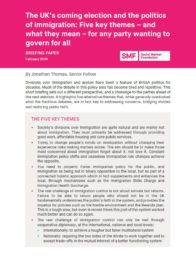Divisions over immigration and asylum have been a feature of British politics for decades. Much of the debate in this policy area has become tired and repetitive. This short briefing sets out a different perspective, and a challenge to the parties ahead of the next election. It highlights five alternative themes that, while generally overlooked amid the fractious debates, are in fact key to addressing concerns, bridging divides and restoring public faith.
THE FIVE KEY THEMES
- Society’s divisions over immigration are quite natural and are mainly not about immigration. They must primarily be addressed through providing good work, affordable housing and core public services.
- Trying to change people’s minds on immigration without changing their experience risks making matters worse. The aim should be to make those most concerned about immigration forget about it, not love it. Constant immigration policy shifts and ceaseless immigration rule changes achieve the opposite.
- You need to properly frame immigration policy for the public, and immigration as being not in binary opposition to the local, but as part of a connected holistic approach which in fact supplements and enhances the local, through mechanisms such as the Immigration Skills Charge and Immigration Health Surcharge.
- The real challenge of immigration control is not about arrivals but returns. Failure to be able to return people who should not be in the UK fundamentally undermines the public’s faith in the system, and provides the impetus for policies such as the hostile environment and the Rwanda plan. This is a tough area, but even in recent times this part of the system worked much better and can do so again.
- The real challenge of immigration control can only be met through cooperative diplomacy, at the international, national and local levels:
- Internationally: to achieve a tougher but fairer multilateral system
- Nationally: requiring the two sides of the divide to work together and to accept trade-offs in the mutual interest of a better functioning system
- Locally: the complementary skills and experience of central and local government – currently often at odds and wasted – must be brought into a much more productive relationship.

DOWNLOAD THE BRIEFING: PDF
